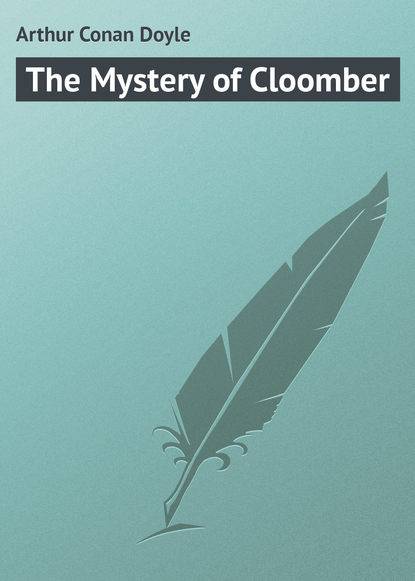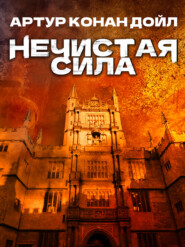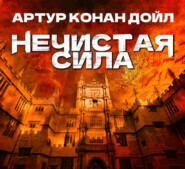По всем вопросам обращайтесь на: info@litportal.ru
(©) 2003-2025.
✖
The Mystery of Cloomber
Настройки чтения
Размер шрифта
Высота строк
Поля
"Another hour!" Mordaunt groaned, "every minute seems an age."
"Lie down on the sofa and rest yourself," said I. "You cannot serve your father better than by laying up all the strength you can, for we may have a weary trudge before us. But you mentioned a packet which the general had intended for me."
"It is here," he answered, drawing a small, flat parcel from his pocket and handing it over to me, "you will find, no doubt, that it will explain all which has been so mysterious."
The packet was sealed at each end with black wax, bearing the impress of the flying griffin, which I knew to be the general's crest. It was further secured by a band of broad tape, which I cut with my pocket-knife. Across the outside was written in bold handwriting: "J. Fothergill West, Esq.," and underneath: "To be handed to that gentleman in the event of the disappearance or decease of Major-General J. B. Heatherstone, V.C., C.B., late of the Indian Army."
So at last I was to know the dark secret which had cast a shadow over our lives. Here in my hands I held the solution of it.
With eager fingers I broke the seals and undid the wrapper. A note and a small bundle of discoloured paper lay within. I drew the lamp over to me and opened the former. It was dated the preceding afternoon, and ran in this way:
My dear West, – I should have satisfied your very natural curiosity on the subject which we have had occasion to talk of more than once, but I refrained for your own sake. I knew by sad experience how unsettling and unnerving it is to be for ever waiting for a catastrophe which you are convinced must befall, and which you can neither avert nor accelerate.
Though it affects me specially, as being the person most concerned, I am still conscious that the natural sympathy which I have observed in you, and your regard for Gabriel's father, would both combine to render you unhappy if you knew the hopelessness and yet the vagueness of the fate which threatens me. I feared to disturb your mind, and I was therefore silent, though at some cost to myself, for my isolation has not been the least of the troubles which have weighed me down.
Many signs, however, and chief among them the presence of the Buddhists upon the coast as described by you this morning, have convinced me that the weary waiting is at last over and that the hour of retribution is at hand. Why I should have been allowed to live nearly forty years after my offence is more than I can understand, but it is possible that those who had command over my fate know that such a life is the greatest of all penalties to me.
Never for an hour, night or day, have they suffered me to forget that they have marked me down as their victim. Their accursed astral bell has been ringing my knell for two-score years, reminding me ever that there is no spot upon earth where I can hope to be in safety. Oh, the peace, the blessed peace of dissolution! Come what may on the other side of the tomb, I shall at least be quit of that thrice terrible sound.
There is no need for me to enter into the wretched business again, or to detail at any length the events of October 5th, 1841, and the various circumstances which led up to the death of Ghoolab Shah, the arch adept.
I have torn a sheaf of leaves from my old journal, in which you will find a bald account of the matter, and an independent narrative was furnished by. Sir Edward Elliott, of the Artillery, to the Star of India some years ago – in which, however, the names were suppressed.
I have reason to believe that many people, even among those who knew India well, thought that Sir Edward was romancing, and that he had evolved his incidents from his imagination. The few faded sheets which I send you will show you that this is not the case, and that our men of science must recognise powers and laws which can and have been used by man, but which are unknown to European civilisation.
I do not wish to whine or to whimper, but I cannot help feeling that I have had hard measure dealt me in this world. I would not, God knows, take the life of any man, far less an aged one, in cold blood. My temper and nature, however, were always fiery and headstrong, and in action when my blood is up, I have no knowledge of what I am about. Neither the corporal nor I would have laid a finger upon Ghoolab Shah had we not seen that the tribesmen were rallying behind him. Well, well, it is an old story now, and there is no profit in discussing it. May no other poor fellow ever have the same evil fortune!
I have written a short supplement to the statements contained in my journal for your information and that of any one else who may chance to be interested in the matter.
And now, adieu! Be a good husband to Gabriel, and, if your sister be brave enough to marry into such a devil-ridden family as ours, by all means let her do so. I have left enough to keep my poor wife in comfort.
When she rejoins me I should wish it to be equally divided between the children. If you hear that I am gone, do not pity, but congratulate
Your unfortunate friend,
John Berthier Heatherstone.
I threw aside the letter and picked up the roll of blue foolscap which contained the solution of the mystery. It was all ragged and frayed at the inner edge, with traces of gum and thread still adhering to it, to show that it had been torn out of a strongly bound volume. The ink with which it had been written was faded somewhat, but across the head of the first page was inscribed in bold, clear characters, evidently of later date than the rest: "Journal of Lieutenant J. B. Heatherstone in the Thull Valley during the autumn of 1841," and then underneath:
This extract contains some account of the events of the first week of October of that year, including the skirmish of the Terada ravine and the death of the man Ghoolab Shah.
I have the narrative lying before me now, and I copy it verbatim. If it contains some matter which has no direct bearing upon the question at issue, I can only say that I thought it better to publish what is irrelevant than by cutting and clipping to lay the whole statement open to the charge of having been tampered with.
XV. The day-book of John Berthier Heatherstone
Thull Valley, Oct. 1, 1841. – The Fifth Bengal and Thirty-third Queen's passed through this morning on their way to the Front. Had tiffin with the Bengalese. Latest news from home that two attempts had been made on the Queen's life by semi-maniacs named Francis and Bean.
It promises to be a hard winter. The snow-line has descended a thousand feet upon the peaks, but the passes will be open for weeks to come, and, even if they were blocked, we have established so many depots in the country that Pollock and Nott will have no difficulty in holding their own. They shall not meet with the fate of Elphinstone's army. One such tragedy is enough for a century.
Elliott of the Artillery, and I, are answerable for the safety of the communications for a distance of twenty miles or more, from the mouth of the valley to this side of the wooden bridge over the Lotar. Good enough, of the Rifles, is responsible on the other side, and Lieutenant-Colonel Sidney Herbert of the Engineers, has a general supervision over both sections.
Our force is not strong enough for the work which has to be done. I have a company and a half of our own regiment, and a squadron of Sowars, who are of no use at all among the rocks. Elliott has three guns, but several of his men are down with cholera, and I doubt if he has enough to serve more than two.
[Note: capsicum for cholera – tried it]
On the other hand, each convoy is usually provided with some guard of its own, though it is often absurdly inefficient. These valleys and ravines which branch out of the main pass are alive with Afridis and Pathans, who are keen robbers as well as religious fanatics. I wonder they don't swoop down on some of our caravans. They could plunder them and get back to their mountain fastnesses before we could interfere or overtake them. Nothing but fear will restrain them.
If I had my way I would hang one at the mouth of every ravine as a warning to the gang. They are personifications of the devil to look at, hawk-nosed, full-lipped, with a mane of tangled hair, and most Satanic sneer. No news today from the Front.
October 2. – I must really ask Herbert for another company at the very least. I am convinced that the communications would be cut off if any serious attack were made upon us.
Now, this morning two urgent messages were sent me from two different points more than sixteen miles apart, to say that there were signs of a descent of the tribes.
Elliott, with one gun and the Sowars, went to the farther ravine, while I, with the infantry, hurried to the other, but we found it was a false alarm. I saw no signs of the Hillmen, and though we were greeted by a splutter of jezail bullets we were unable to capture any of the rascals.
Woe betide them if they fall into my hands. I would give them as short a shrift as ever a Highland cateran got from a Glasgow judge. These continued alarms may mean nothing or they may be an indication that the Hillmen are assembling and have some plan in view.
We have had no news from the Front for some time, but to-day a convoy of wounded came through with the intelligence that Nott had taken Ghuznee. I hope he warmed up any of the black rascals that fell into his hands.
No word of Pollock.
An elephant battery came up from the Punjab, looking in very good condition. There were several convalescents with it going up to rejoin their regiments. Knew none of them except Mostyn of the Hussars and young Blakesley, who was my fag at Charterhouse, and whom I have never seen since.
Punch and cigars al fresco up to eleven o'clock.
Letters to-day from Wills & Co. about their little bill forwarded on from Delhi. Thought a campaign freed a man from these annoyances. Wills says in his note that, since his written applications have been in vain, he must call upon me in person. If he calls upon me now he will assuredly be the boldest and most persevering of tailors.
A line from Calcutta Daisy and another from Hobhouse to say that Matilda comes in for all the money under the will. I am glad of it.
October 3. – Glorious news from the Front today. Barclay, of the Madras Cavalry, galloped through with dispatches. Pollock entered Cabul triumphantly on the 16th of last month, and, better still, Lady Sale has been rescued by Shakespear, and brought safe into the British camp, together with the other hostages. Te Deum Laudamus!
This should end the whole wretched business – this and the sack of the city. I hope Pollock won't be squeamish, or truckle to the hysterical party at home. The towns should be laid in ashes and the fields sown with salt. Above all, the Residency and the Palace must come down. So shall Burnes, McNaghten, and many another gallant fellow know that his countrymen could avenge if they could not save him!
It is hard when others are gaining glory and experience to be stuck in this miserable valley. I have been out of it completely, bar a few petty skirmishes. However, we may see some service yet.
A jemidar of ours brought in a Hillman today, who says that the tribes are massing in the Terada ravine, ten miles to the north of us, and intend attacking the next convoy. We can't rely on information of this sort, but there may prove to be some truth in it. Proposed to shoot our informant, so as to prevent his playing the double traitor and reporting our proceedings. Elliott demurred.
If you are making war you should throw no chance away. I hate half-and– half measures. The Children of Israel seem to have been the only people who ever carried war to its logical conclusion – except Cromwell in Ireland. Made a compromise at last by which the man is to be detained as a prisoner and executed if his information prove to be false. I only hope we get a fair chance of showing what we can do.
No doubt these fellows at the Front will have C.B.'s and knighthoods showering upon them thick and fast, while we poor devils, who have had most of the responsibility and anxiety, will be passed over completely. Elliott has a whitlow.
The last convoy left us a large packet of sauces, but as they forgot to leave anything to eat with them, we have handed them over to the Sowars, who drink them out of their pannikins as if they were liqueurs. We hear that another large convoy may be expected from the plains in the course of a day or two. Took nine to four on Cleopatra for the Calcutta Cup.
October 4. – The Hillmen really mean business this time, I think. We have had two of our spies come in this morning with the same account about the gathering in the Terada quarter. That old rascal Zemaun is at the head of it, and I had recommended the Government to present him with a telescope in return for his neutrality! There will be no Zemaun to present it to if I can but lay hands upon him.
We expect the convoy tomorrow morning, and need anticipate no attack until it comes up, for these fellows fight for plunder, not for glory, though, to do them justice, they have plenty of pluck when they get started. I have devised an excellent plan, and it has Elliott's hearty support. By Jove! if we can only manage it, it will be as pretty a ruse as ever I heard of.
Our intention is to give out that we are going down the valley to meet the convoy and to block the mouth of a pass from which we profess to expect an attack. Very good. We shall make a night-march to-night and reach their camp. Once there I shall conceal my two hundred men in the waggons and travel up with the convoy again.

















